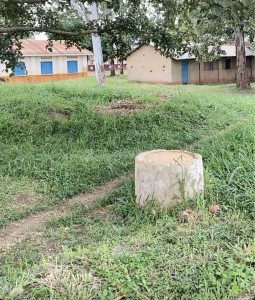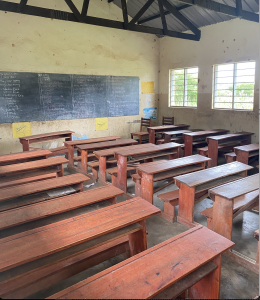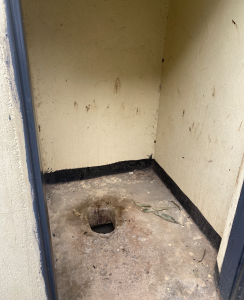St. Martin’s Primary School is only accessible by a dirt road. It is, quite literally, off the beaten path. Located about 20 km from Gulu, St. Martin’s is surrounded by bush that extends for miles. Many classrooms do not have roofs, and are overgrown with underbrush — an unfortunate consequence of an ongoing lawsuit between contractors that has left numerous buildings half-finished since 2013. Until these buildings are finished, they are unusable.
This is unfortunate because the school has an enormous population of 1445 students, but only 11 classrooms. 300 students are crammed into each classroom. No wonder why COVID-19 spread so quickly in schools!
Besides an inadequate number of classrooms, there are also an inadequate number of latrines. 10 stances serve 1445 students — and teachers, and parents, and staff, and visitors. That is a ratio of 1 toilet to 144 students. 5 of the stances are for girls, including a washroom, and 5 are for boys. None of the stances are drainable, and the boys’ are about to reach full capacity. The girls have nowhere to deposit sanitary pads after use. Furthermore, the teachers do not have their own stances. When they need to use the bathroom, they are forced to walk to the neighboring church and use their facilities, which they described as incredibly embarrassing.
None of that is even to mention the accessibility of the facilities for people with disabilities. In Uganda, 12.4% of the population, or 4.5 million people, live with some form of disability. Unfortunately, persons with disabilities are among the most marginalized groups in both the public and private spheres. Women with disabilities especially suffer from lack of access to basic needs, such as education opportunities.
St. Martin’s is a case in point for the additional challenges faced by people with disabilities. The latrines are located about 40 meters from the nearest classroom. The narrow, winding dirt path that leads to both the girls and boys’ latrines was difficult to navigate for me — an able-bodied person. The path is far too small, uneven, and overgrown for a person in a wheelchair, or on crutches, to readily use.
This situation violates the human right to sanitation, which, in the words of the Special Rapporteur on the human rights to safe drinking water and sanitation, “entitles everyone, without discrimination, to have physical and affordable access to sanitation, in all spheres of life, that is safe, hygienic, secure, socially and culturally acceptable and that provides privacy and ensures dignity.”
It is important to remember that the blame lies not with the school, but with the government, which continuously fails to provide resources for schools like St. Martin’s Primary.
In the face of the dire situation at St. Martin’s, Gulu Disabled Person’s Union (GDPU) will be building accessible toilets there this summer. GDPU’s approach to Water, Sanitation and Hygiene (WASH) is inclusive, sustainable, and successful. Having already installed toilets at four other schools that remain operational to this day, Patrick, the project manager of WASH at GDPU, has become something of an expert on toilets.
The key to GDPU’s model is its incorporation of teachers and parents from planning to construction to maintenance, which inspires community ownership of the toilets, and gives community members incentive to maintain the toilets.
 At the beginning of the process, GDPU meets with teachers and parents to solicit their advice, such as where the toilet would be best placed, and ensure that their needs are met. Usually, parents take shifts digging the latrine pit with the advice of the engineer. However, during COVID-19, this proves a challenge. According to the Ugandan Ministry of Health’s Standard Operating Procedures (SOPs), no more than 20 people can meet at once, all must wear a mask, and all must be at least 2 meters apart.
At the beginning of the process, GDPU meets with teachers and parents to solicit their advice, such as where the toilet would be best placed, and ensure that their needs are met. Usually, parents take shifts digging the latrine pit with the advice of the engineer. However, during COVID-19, this proves a challenge. According to the Ugandan Ministry of Health’s Standard Operating Procedures (SOPs), no more than 20 people can meet at once, all must wear a mask, and all must be at least 2 meters apart.
Given these procedures, GDPU has had to adapt its modus operandi; instead of gathering in one large group, parents will dig in small groups, and will continually rotate. Another staple of GDPU’s procedure that has been impacted by COVID is teacher inclusivity training. Instead of gathering all the teachers together to explain toilet maintenance and disability accessibility, GDPU will produce a brochure that will be provided to teachers and parents alike with frequently asked questions.
Lastly, the handover ceremony, a celebration of the community’s work on the toilet during which it is “handed over” to them will be pushed to September, when (hopefully) more than 20 people can gather at once.
Posted By Anna Braverman
Posted Jun 15th, 2021




2 Comments
Iain Guest
June 20, 2021
What a good and thorough analysis of the WASH crisis in primary schools. One toilet for every 144 students is unacceptable. It will be so nice to get this school refurbished. Hope you can be there for the opening!!
Sarina Maini
June 23, 2021
This was a wonderful blog Anna! I really like the comparative approach you took in showing that while the government is not providing resources, there are ways the community can take collective responsibility to improve the condition of these schools.